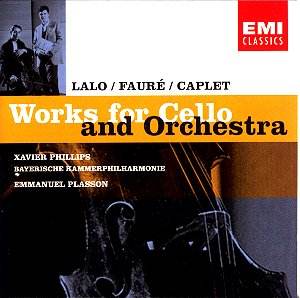The sound on this disc is big, beefy and gripping
without cheating on refinement in the less demonstrative moments - as
in the Iberian thistledown Intermezzo of the Lalo. The Lalo
Concerto is endearing without
being very deep. At surface it is provocative. The Prélude is almost
Beethovenian and uncannily predictive of the romantically propulsive
gestures of the Dvořák concerto of almost two decades later. The
Lalo has been recorded by all manner of cellists: Ma (Sony),
Harrell (Decca), Haimowitz (DG), Starker (Mercury), Sophie Rolland (ASV),
Noras (Finlandia), Dupré (EMI), Anne Gastinel (Auvidis), Ofra
Harnoy (RCA) amongst others but going by my memories of the Harrell
and Harnoy Xavier Phillips has little to fear in comparison with any
of these. The work can be thought of as a cello counterpart to the Glazunov
violin concerto. Its melodic qualities are at their best in the first
two movements. In the finale the invention is rather slender though
Lalo makes instinctively creative use of the Hispanic accent established
in the Intermezzo. Unlike the Symphonie Espagnole Lalo
sticks to the orthodox ration of three movements. Contrast this work
with the succulently rounded and impassioned damask-tones of the Fauré
Élégie.
The Caplet Épiphanie stands head
and shoulders above the other two works. It is a work of the Twentieth
Century both chronologically and in musical essence. Gravitas and fantasy
meet in these pages in a way that reaches out towards the Dutilleux
concerto. The music peers at you in a sharply detailed focus that partakes
of Ravel (Rhapsodie Espagnole not Daphnis) and Frank Bridge
(Oration rather than Summer). It was Bridge’s Oration
(subtitled Concerto Elegiaco) that comes to mind most often.
I have played this disc time after time and am still wondering at Épiphanie’s
resiliently fine and memorable qualities. It is psychologically profound
music. Disturbing waves radiate through the music and there are moments,
especially towards the end of the Cortège, where Caplet
speaks of tortured emotions of a type later explored by Miklós
Rózsa in his Jules Dassin films. The final Danse is urgently
and darkly jazzy and overhung. The three sections are played without
break. Épiphanie was described by the composer as a ‘Fresque’
and subtitled ‘d’après une légende éthiopienne’.
It was written only two years before the composer’s sudden death as
a result of wounds and gas poisoning of the lungs suffered while serving
as a poilu during the Great War. I have already mentioned Oration.
I detect a very strong spiritual resemblance between this work and Bridge’s
masterpiece. Both seem driven by a desperately active imagination in
which funereal thoughts are to the fore.. That quick-rattling remorseless
snare-drum accompaniment, as persistent as the ostinato in Sibelius’s
Nightride and Sunrise, speaks of bleaker things in the Cadence
than the claimed programmatic association: the journey of the Magi to
Bethlehem.
This is not Épiphanie’s first recording.
That honour fell to Frédéric Lodéon who recorded
the work for Erato in the very early 1980s. This was STU71368S and the
coupling was the Lalo concerto. The orchestra was the Philharmonia conducted
by Charles Dutoit. The LP was awarded the Diapason d’Or. As far as I
can see that recording has not found its way onto CD. It would be interesting
to compare the two.
It is to Xavier Phillips’ and EMI’s great credit that
they chose to record the Caplet. Let us hope that this is not the last
time this cellist will play the piece or venture into uncharted waters.
Yo-Yo Ma launched his career with the Lyrita recording of the Finzi
Cello Concerto (Lyrita and needless to say still on vinyl with no sign
of CD in prospect). As far as I am aware those 1978 studio sessions
are the only occasions when Mr Ma performed the Finzi. Parisian-born
M. Phillips should surely go on to record the Florent Schmitt Introduction,
Récit et Congé - also for cello and orchestra - a
work gloriously performed by André Navarra and Anne Gastinel.
In fact it is something of a disappointment that opportunity was not
taken to add that extremely fine work to this collection. After all
the playing time is only 52.51.
Phillips is very strongly rendered by Michael Kempff
and Gerhard Gruber. There are good notes by Michael Jameson.
An outstanding disc made so not merely by Xavier Phillips’
brilliance of execution but by the imaginatively volatile Caplet. About
as far away from the salon as you could possibly get. Do not miss it.
This is certainly not a disc of interest only to cellophiles.
Rob Barnett
